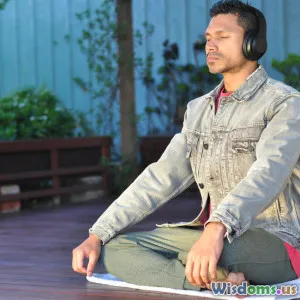
Cultivating Family Unity and Cooperation
8 min read Explore practical strategies to foster family unity and cooperation effectively. (0 Reviews)
Cultivating Family Unity and Cooperation
Introduction
In a world where the pace of life becomes increasingly frenetic, the importance of family ties cannot be overemphasized. Family unity and cooperation serve as the bedrock of emotional support and resilience. Have you ever wondered why some families appear to seamlessly function together while others struggle with conflicts and misunderstandings? Family dynamics are complex, often kneaded by individual experiences and societal pressures. Yet, cultivating a sense of togetherness, understanding, and teamwork is possible. This article will explore practical strategies and insights to forge stronger familial bonds and enhance cooperation within the family.
Understanding Family Dynamics
Before diving into ways to enhance unity and cooperation, it’s essential to understand the nuances of family dynamics. Families consist of individuals with varying perspectives, backgrounds, and traditions, which can occasionally lead to friction. According to the American Psychological Association, about 40%-50% of married couples in the U.S. divorce, a statistic that highlights the challenges faced by families. Reinforcing unity can significantly diminish these rates. Understanding how family members interact, deal with conflicts, and express appreciation plays a pivotal role in shaping healthy dynamics.
The Role of Communication
One of the crucial pillars of family unity is effective communication. Open, honest dialogue fosters understanding and trust among family members. For example, during family meetings, each member can share their feelings, concerns, and aspirations. A 2016 study by the University of Virginia revealed that families who practice open communication reported higher satisfaction levels.
Tips for Effective Communication
- Active Listening: Encourage each family member to listen actively rather than just wait for their turn to speak.
- Non-Verbal Cues: Pay attention to body language and tone while communicating, which can convey emotions that words might miss.
- Establish Ground Rules: Families can benefit from setting guidelines for discussions, such as no interrupting or personal attacks.
Shared Activities that Bring Families Closer
Engaging in shared activities deepens connections within the family. Whether cooking together, participating in sports, or creating art, these cooperative efforts can instill a sense of purpose and belonging.
Example Activities
- Game Nights: Organize regular family game nights to foster collaboration in a fun atmosphere. Games like Pictionary or charades require teamwork and are excellent for improving rapport.
- Cooking Classes: If you have budding chefs in the family, cooking can be a splendid activity. Dedicating time weekly to prepare meals together enhances cooperative skills and brings joy.
- Outdoor Adventures: Engaging in activities like hiking or biking creates shared memories and fosters a spirit of teamwork.
Embracing Diversity
Families comprise diverse personalities, and this palette of differences can be a source of strength and growth. Rather than viewing unique characteristics as hurdles, they should be embraced as opportunities for learning. Recognizing and respecting diversity promotes cooperation and unity.
Appreciating Unique Interests
- Spotlight Individual Passions: Create moments where family members can share their interests—whether it’s a specific hobby, skill, or achievement. This recognition not only builds self-esteem but also paints a holistic picture of the family.
- Cultural Learning: If a family has members from different backgrounds, exploring each other's traditions can enhance understanding. Celebrating Diwali or allowing a family member to showcase a cultural dish during dinner can be enlightening.
The Importance of Forgiveness
Conflict is a natural part of any relationship, including families. Fostering a culture of forgiveness, however, can significantly improve cooperation. According to a study in the Journal of Family Psychology, families practicing forgiveness exhibited lower levels of conflict and enhanced satisfaction.
Steps to Foster Forgiveness
- Take Responsibility: Acknowledge mistakes and apologize sincerely. This demonstrates maturity and humility.
- Listen to Feelings: Provide a platform for family members to express their hurt without fear of backlash.
- Move Forward: Encourage leaving past grievances behind to make space for renewed relationships and trust.
Consistent Family Rituals
Family rituals enhance a sense of stability and belonging. These rituals, big or small, establish traditions that solder family members together.
Ideas for Family Rituals
- Daily Family Check-ins: Carve out a moment each day where family members share highs and lows. This builds transparency and opens pathways for support.
- Annual Vacations or Celebrations: Establishing habits, like a yearly family vacation or holiday gathering, can bond families and generate cherished memories. The shared anticipation and planning strengthen connections.
- Gratitude Jar: Create a gratitude jar where family members drop notes about things they appreciated during the week. Reading these notes together can foster positivity and encourage cooperative behaviors.
The Role of Professional Guidance
Sometimes, despite best efforts, families face challenges that seem unresolvable. Seeking guidance from a family therapist can introduce objective perspectives. These professionals can facilitate healthier communication patterns and provide tools to navigate conflicts productively. Moreover, cognitive-behavioral therapy practices often pinpoint underlying issues contributing to family disharmony, empowering families toward collaborative healing.
Conclusion
Cultivating family unity and cooperation is a continuous journey rather than a one-time achievement. By emphasizing effective communication, shared activities, diversity appreciation, and forgiveness, families can stitch together a fabric of connection solid and enduring. The framework established will not only foster a love-filled environment but also cultivate emotionally resilient individuals. As a well-known saying goes, “Familial bonds grow stronger with roots and branches, and the heart becomes more whole with each shared moment.” So, take small steps today; they may just lead to family unity for years to come.
Rate the Post
User Reviews
Popular Posts




















